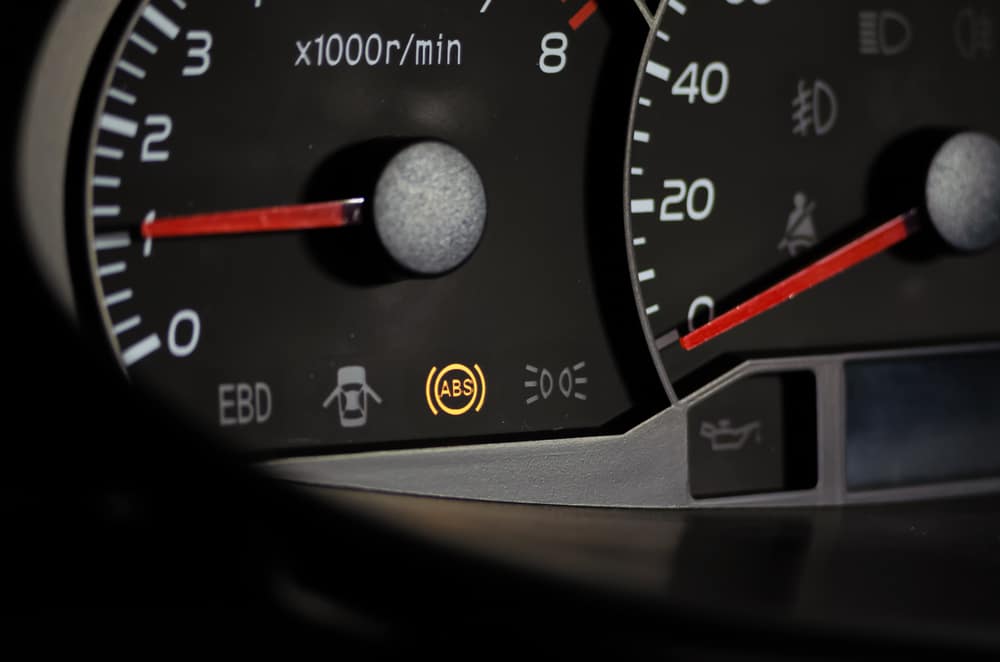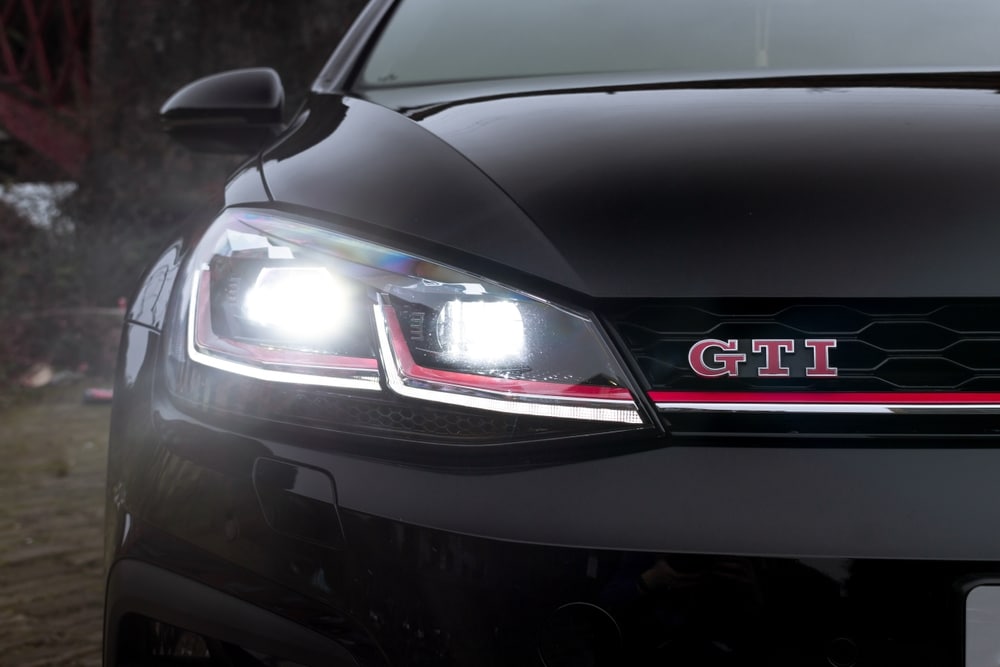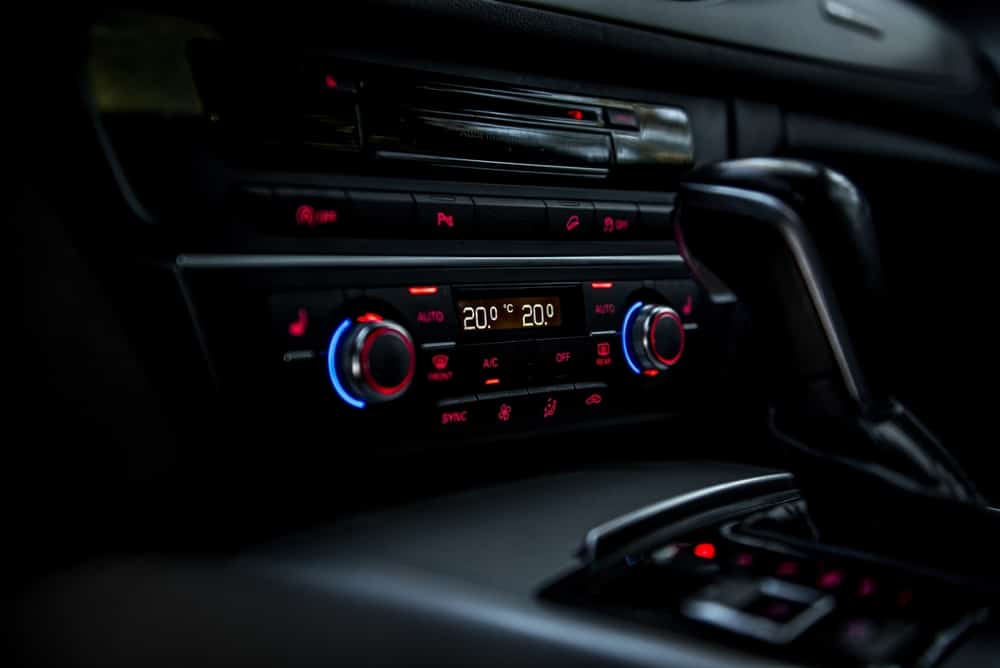Anti-Lock Brakes
You’re driving through Eastbourne when the car ahead slams on the brakes. You react instantly, but instead of stopping safely, the wheels lock, the tyres screech, and you lose the ability to steer. As the car skids sideways, your mind races back to that ABS warning light you’d been meaning to get checked. Now it’s too late.
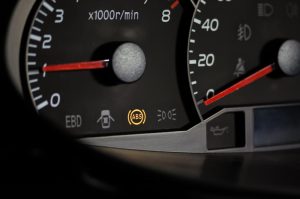
Your anti-lock brakes (ABS) are there to stop this exact situation from happening. It prevents the wheels from locking during hard braking, helping you keep control when it matters most. But once that warning light appears, there’s a good chance that protection has already failed.
At South Coast Garage in Eastbourne, we help local drivers catch ABS problems before they turn into emergencies. Whether it’s a faulty sensor, damaged wiring or a full ABS module fault, our team uses specialist tools to locate the issue and fix it properly.
In this blog, we’ll explain how anti-lock brakes work, why that warning light appears, and what happens if you ignore it.
Let’s get straight into it.
What Anti-Lock Brakes Do During Sharp Stops
Your anti-lock braking system (ABS) is there to help you stay in control when you need to brake hard. It doesn’t just help slow the car down; it makes sure you can keep control of your steering while it happens.
In slippery or sudden-stop situations, your car’s wheels can lock up. This causes the tyres to skid across the road surface, stopping them from rotating and leaving you unable to steer. ABS responds by pulsing the brake pressure at individual wheels several times per second, avoiding complete lock-up and allowing the tyres to keep rotating just enough to stay in contact with the road.
The result is simple: you stay in control of the vehicle’s direction, even while braking at full force.
It’s a system that might only activate once in a hundred drives. But when it does, it could be the reason you avoid a crash. If the ABS warning light is on, there’s no guarantee that safety net will be there when it matters most.
How ABS Reacts When One Wheel Begins to Lock
While you’re driving, your ABS monitors each wheel constantly, but it doesn’t intervene unless it detects something wrong. The moment one wheel starts to decelerate faster than the others, the system recognises the risk of a lock-up and springs into action.
Each wheel has a dedicated sensor that feeds live speed data to the ABS control unit. When the system detects a difference, usually just milliseconds before the wheel locks, it signals the hydraulic modulator. This component uses solenoid valves to quickly release brake pressure at that wheel, then reapply it as grip returns.
This cycle happens repeatedly, several times per second, far faster than any driver could manage. The result is a controlled slowdown with the ability to steer maintained. It’s normal to feel a rapid pulsing through the brake pedal when ABS kicks in. That’s a clear sign the system is working — reducing the risk of a skid, helping the tyres hold traction, and giving you the control to steer away from danger.
If your ABS light is on, this crucial response might not happen at all. That’s when it’s time to give South Coast Garage in Eastbourne a call. A single faulty ABS sensor, reluctor, modulator, valve, wiring harness or software fault can stop your ABS from working, so expert care is required.
The Critical Components That Make Up Your Anti-Lock Brakes
Your anti-lock braking system relies on several components working in harmony. If just one of them fails, the system may switch off entirely, and that’s often when the ABS warning light appears.
Here’s what each part does:
ABS sensors – Fitted at each wheel hub, these sensors track the speed of rotation in real time. If a sensor becomes damaged, misaligned, or fails to send accurate data, the system can no longer function correctly.
ABS control unit (ECU) – This electronic module receives signals from all four sensors and calculates how the brakes should respond. It’s the brain behind the system, and if it develops a fault, ABS support may be lost altogether.
Hydraulic modulator and pump – Found in the engine bay, this unit responds to signals from the ECU to control brake pressure. It uses solenoid valves and an electric pump to pulse the brakes at high speed, helping prevent wheel lock.
Brake lines and valves – Built into the ABS hydraulic modulator, solenoid valves work in sync with the brake lines to control pressure at each wheel. During heavy braking, they open and close rapidly to hold, reduce or increase fluid pressure, helping prevent wheel lock and maintain control. This process repeats several times per second, all within fractions of a second.
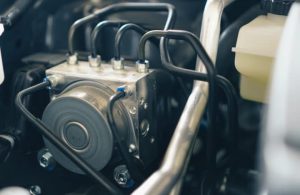
At South Coast Garage, we carry out full inspections of every ABS component, including sensor readings, wiring integrity and potential ABS module faults.
Take a look at our blogs on Brake Pads, Brake Discs and The Braking System Explained for the full picture on other areas of your car’s braking system.
How ABS Data Powers the Safety Systems Around It
Your ABS isn’t just there to prevent skids. It also feeds vital data into the systems that help you stay in control during complex driving conditions. When ABS stops working, these connected systems may also shut down.
Here’s how they work together:
Electronic Brakeforce Distribution (EBD) – EBD varies the brake force between front and rear wheels depending on load. Without input from ABS sensors, it can’t respond properly, increasing the chance of instability.
Traction Control System (TCS) – If a driven wheel slips, TCS reduces power or applies braking pressure to regain traction. It depends on real-time ABS sensor feedback to react in time.
Electronic Stability Programme (ESP) – ESP corrects understeer and oversteer by braking individual wheels. It relies on ABS data to detect when the vehicle begins to slide out of line.
These systems are highly complex and should always be looked after by qualified experts. If you’re looking for a team in Eastbourne that can help, give South Coast Garage a call.
What Can Interfere with ABS Performance
Your anti-lock braking system plays a crucial role in keeping you steady under pressure, but only if the conditions allow it to operate correctly. Anything that disrupts how ABS monitors wheel speed or manages brake force can reduce its effectiveness or disable it entirely.
Road conditions are often the first challenge. On uneven or slippery surfaces like snow, gravel, or wet roads, ABS may struggle to maintain grip. It can still assist with steering, but it’s not a replacement for careful driving in tough environments.
More often, the issue lies within the system itself. A faulty ABS sensor, damaged wiring, or a sluggish hydraulic modulator can all interfere with how ABS responds when needed. These kinds of problems usually trigger the ABS warning light, which is the clearest sign that the system is compromised.
At South Coast Garage in Eastbourne, we know how quickly these faults can escalate. That’s why we always treat ABS warnings seriously and carry out a complete, technical assessment to pinpoint the issue and restore your vehicle’s safety systems fully.
Signs Your Anti-Lock Brakes Might Have an Issue
Your anti-lock braking system is designed to stay in the background, until the moment you need it most. But when something goes wrong, there are early signs that shouldn’t be ignored.
The ABS warning light won’t turn off
Seeing the ABS light briefly at startup is normal. But if it stays on while you drive, it means a fault has been detected. The system may have already shut down. Standard braking will still work, but the extra protection of ABS may be gone. If you’re unsure, call South Coast Garage on 01323 734473 and let us check it for you.
No pulsing sensation when braking hard
During heavy braking, ABS creates a fast pulsing in the brake pedal. If this doesn’t happen, and your wheels lock instead, it’s a clear sign the system isn’t engaging.
Multiple brake warning lights are showing
A faulty ABS sensor or control module can cause additional warning lights to appear, including the main brake warning light. This usually signals a deeper problem and should always be taken seriously.
At South Coast Garage in Eastbourne, we carry out a full inspection of your ABS, from the sensors to the wiring and control unit, so you’re not left guessing about your safety.
Why You Shouldn’t Ignore an ABS Warning Light
When the ABS light is on but your brakes still feel normal, it’s easy to assume nothing is wrong. But without ABS, your ability to stay in control during an emergency stop could vanish, just when you need it most.
The longer the warning is ignored, the greater the risk. Without ABS, your tyres are more likely to lock during sudden braking, making it harder to steer and increasing your stopping distance. If the brake warning light also appears, the fault may be more serious than it seems.
There’s also the MOT to consider. A lit ABS warning light is an automatic fail, no matter how well your brakes appear to function. And the longer the fault is left, the more damage can develop. Corrosion, moisture ingress and electrical faults can all spread, sometimes resulting in full ABS module failure.
At South Coast Garage in Eastbourne, we take every ABS light seriously. Our team will carry out a detailed investigation, identify the root cause, and get your braking system back to full working order before it puts your safety at risk.
Trust South Coast Garage For Expert Anti-Lock Brake Care
Your anti-lock braking system is built to protect you, but if that ABS light stays on, that protection could already be gone. Acting early can stop a small fault from becoming a serious safety risk.
At South Coast Garage in Eastbourne, we carry out complete ABS and brake system checks. From sensor faults to full ABS module failures, we find the root cause and get your braking system working properly again.
Here’s what you can expect when you choose us:
✔ Specialist diagnosis for ABS faults and warning lights
✔ Clear answers and trusted advice from experienced technicians
✔ 12-month parts and labour guarantee
✔ Free courtesy car available while your vehicle is with us
We help keep drivers safe across Eastbourne, Hailsham, Brighton and East Sussex. Check out our {{average-rating}} star Google rating from {{review-count}} satisfied customers.
📞 Call South Coast Garage on 01323 734473 to book your ABS check today.
Call Now 01323 734473Save on Brake Servicing
